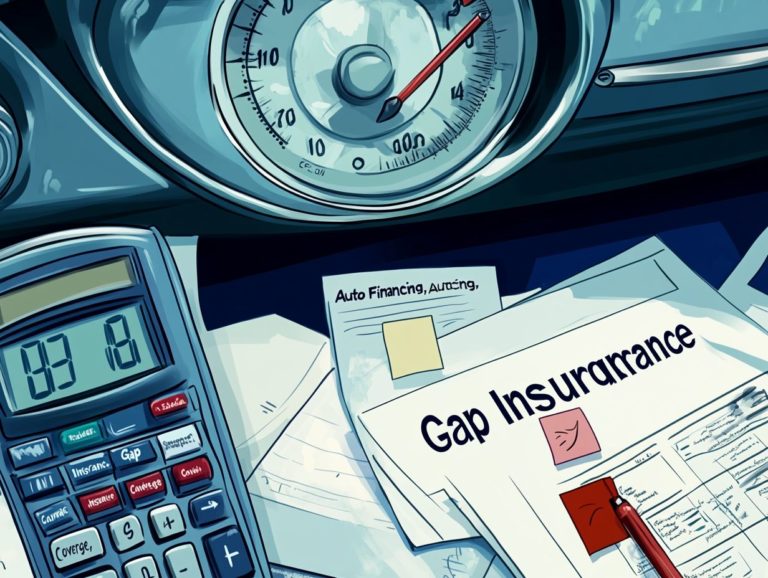The Complete Guide to First-Time Car Financing
Navigating the world of car financing may seem daunting, especially if you’re a first-time buyer.
Understanding car financing and the available options is crucial for making informed decisions. This guide will help you assess your budget and credit score, explore different financing avenues, and provide important tips for a successful application.
You’ll learn how to compare deals effectively and develop strategies for managing your payments. With the right knowledge, you can confidently drive off in your new car without straining your finances.
Contents
- Key Takeaways:
- Understanding Car Financing
- Preparing for Car Financing
- Applying for Car Financing
- Choosing the Right Car Financing Option
- Managing Car Financing
- Frequently Asked Questions
- What is ‘The Complete Guide to First-Time Car Financing’?
- Is this guide suitable for all first-time car buyers?
- What information does ‘The Complete Guide to First-Time Car Financing’ cover?
- How can this guide help me save money?
- Is this guide only applicable to brand new cars?
- Can this guide guarantee that I will get financing for my first car?
Key Takeaways:

Car financing lets you purchase a car without paying the full amount upfront. It’s important to understand the different types and choose the right option for your needs. Before applying for car financing, check your budget and credit score, and explore various options to ensure you get the best deal. When applying for car financing, be prepared with all necessary documents and follow tips for a successful application. After securing financing, make timely payments and have a plan for any financial challenges that may arise.
Understanding Car Financing
Understanding the details of car financing is important for anyone considering a vehicle purchase, especially first-time buyers who may find themselves navigating new options. For a clearer picture, it’s helpful to explore the car financing timeline.
You need to carefully check your budget and evaluate your credit score while exploring loan terms that fit your financial situation. This approach helps you make informed decisions that can influence your car ownership experience.
Understanding interest rates, dealership offers, and insurance costs will help you navigate the complexities of auto financing, giving you a clearer picture of the total expenses involved in acquiring a vehicle.
What is Car Financing?
Car financing is the process of securing a loan to purchase a vehicle, allowing you to spread the cost of ownership over time instead of making a large upfront payment. This arrangement makes it possible to acquire a car that might otherwise be out of reach.
Typically, a lender provides you with the funds to buy the vehicle, and in return, you commit to repaying this amount through a series of installments over a set term. Interest rates are important as they determine the total amount you’ll pay over time; lower rates mean lower overall costs.
Your credit score greatly influences your financing options, as higher scores often lead to better interest rates and loan terms, resulting in more favorable payments.
Types of Car Financing
There are various types of car financing available to you, including traditional loans from banks or credit unions, lease agreements, and financing options directly from dealerships.
Each option has advantages and disadvantages that can impact your budget. For example, traditional loans often offer competitive interest rates but usually require a significant down payment and lead to ownership of the vehicle.
On the other hand, leasing often offers lower monthly payments and the chance to drive a new car every few years. However, you won’t own the vehicle outright and may face mileage restrictions.
When making your decision, it’s essential to consider factors like long-term ownership goals, monthly cash flow, and potential maintenance costs. This thoughtful approach will help you make an informed choice that fits your financial situation.
Preparing for Car Financing
Preparing for car financing is a crucial step in your car-buying journey, especially if you’re a first-time buyer. Understanding different car financing options can help you make informed decisions.
Start by thinking about your budget it’s your first step towards the perfect car! Check your credit score and explore financing options that match your income and expenses.
A well-prepared buyer will clearly understand the down payment needed, how to manage monthly payments, and strategies for negotiating favorable loan terms.
Evaluate these aspects now to boost your chances of securing that dream car!
Assessing Your Budget and Credit Score

Assessing your budget and credit score is crucial before entering the car financing world. This step helps you understand what you can afford and how much you can borrow.
Take the time to evaluate your financial situation. This preparation leads to informed choices that guide you to the best financing options.
Understanding credit scores is vital. A higher credit score usually means better loan terms, which can lower your monthly payments and expand your financing options.
Being aware of your financial health lets you navigate car financing confidently.
Exploring Financing Options
Exploring financing options can significantly affect your overall car ownership costs. Factors like interest rates, loan terms, and lender conditions are critical.
Consider different avenues: traditional banks with competitive rates, credit unions with member-focused services, online lenders for convenience, or dealership financing that may offer enticing deals.
Act now to compare rates and save money! Check Annual Percentage Rates (APRs) and consider the loan duration and any fees involved.
This careful examination helps you find the best deal while ensuring you can comfortably meet your financial obligations.
Applying for Car Financing
Applying for car financing is a vital step in your journey. You’ll need to submit a formal application to a lender along with specific documents.
When your application is successful, you can purchase a vehicle that meets your needs. Prepare the necessary documents in advance to streamline this process.
This preparation is key for securing favorable financing terms and managing your future payments easily.
Documents and Requirements
Gather key documents when applying for a car loan. This ensures a smooth approval process.
You ll need proof of income, like pay stubs or tax returns, to assure lenders of your repayment ability.
ID documents, such as your driver s license or passport, verify your identity. A detailed credit history helps lenders assess the risk of extending credit to you.
Requirements may vary by lender. Some might ask for additional documents like bank statements or employment verification. Knowing these details can influence your financing success.
Tips for a Successful Application
Follow these tips for a successful car financing application. They can significantly improve your chances of securing favorable loan terms.
Focus on your credit score, as it affects your eligibility and interest rates. Check for errors in your credit report and fix any discrepancies.
Keep your credit utilization low and make timely payments. Prepare necessary documentation, like proof of income and employment history, to streamline the process.
Understanding different financing options, including loan types and terms, will help you make decisions that align with your financial situation.
Choosing the Right Car Financing Option

Selecting the ideal car financing option is essential for securing the best deal tailored to your needs. You ll want to balance interest rates, terms, and monthly payments that align with your budget.
While optimizing your savings, it s important to grasp the costs linked to each financing alternative. Whether you choose to finance through a dealership, a credit union, or an online lender, understanding these costs will enable you to make an informed decision.
Leveraging tools like an auto loan calculator can deepen your understanding of how various terms and rates impact your total expenses over time. This significantly influences your overall vehicle ownership experience.
Comparing Interest Rates and Terms
Comparing interest rates and terms from various lenders is a crucial step in selecting the right car financing option. Even a minor difference in rates can translate into substantial savings over the life of the loan.
To make an informed choice, evaluate the total cost of borrowing each year, which includes both interest and any additional fees.
By analyzing the total loan costs associated with different rates, you gain clarity on how these figures will affect your monthly payments and overall affordability.
Don t overlook loan terms! They can significantly impact your overall costs. While longer terms may reduce your monthly payment, they often lead to higher total interest paid over time.
When negotiating with lenders, having multiple offers gives you leverage to secure more favorable terms, such as lower interest rates or waived fees. This approach guides you toward a more advantageous financing arrangement.
Considering Additional Fees and Charges
When you’re evaluating car financing options, closely examine any additional fees and charges that may come into play. These can dramatically influence the overall cost of financing and your vehicle ownership experience.
You’ll encounter various fees during the financing process, including:
- Fees lenders charge for processing your loan.
- Documentation fees for preparing the necessary paperwork.
Don’t forget to factor in insurance costs, as lenders often require them. These costs can vary significantly based on the policy you select.
Each of these fees contributes to the total cost of ownership. By understanding these expenses within the framework of your financing plan, you can achieve a clearer and more accurate financial outlook.
Managing Car Financing
Effectively managing car financing is essential for preserving your financial well-being. It ensures you’re well-equipped to handle monthly payments along with any unforeseen costs that come with vehicle ownership.
This means crafting a realistic budget that considers not just your loan payments but also insurance, maintenance, and potential repairs. By doing so, you can avoid the pitfalls of falling behind on your obligations.
With diligent tracking of your expenses and a proactive approach to financial challenges, you can navigate the intricacies of car financing while maximizing your savings and enjoying a seamless ownership experience.
Making Timely Payments
Making timely payments on your car loan is essential, not just for keeping your vehicle but also for safeguarding your credit score. A good credit score plays a significant role in future financing opportunities.
Consistent payments showcase your financial responsibility, helping to build a positive relationship with lenders that can lead to more favorable rates in the future.
If you fall behind, late payments can incur hefty fees and tarnish your credit report. It s crucial to stay vigilant with your payment schedules.
Consider using mobile reminders or budgeting tools to prevent missed deadlines. Additionally, automatic payments can ensure your car loan is managed promptly, reinforcing a robust financial standing.
Dealing with Financial Challenges

Navigating financial challenges related to car financing can feel overwhelming. With proactive management, you can handle unexpected expenses while keeping your loan payments on track.
If you face these hurdles, reach out to your lenders for help. Many lenders offer flexible solutions when times get tough.
Exploring refinancing options can change the game. It may lower your monthly payments, reduce interest rates, or extend your loan terms.
Adjust your budget to prioritize essential expenses. This strategy keeps your car payments manageable and helps you regain control of your finances.
Research community resources or financial counseling services. They provide insights tailored to your situation, helping you make informed decisions.
Frequently Asked Questions
What is ‘The Complete Guide to First-Time Car Financing’?
‘The Complete Guide to First-Time Car Financing’ is a resource that provides essential information and tips for those buying a car for the first time and needing financing options.
Is this guide suitable for all first-time car buyers?
Yes, this guide helps anyone buying a car for the first time and needing financing guidance.
What information does ‘The Complete Guide to First-Time Car Financing’ cover?
This guide includes understanding credit scores, loans, negotiating with dealerships, and finding the best interest rates. It also offers budgeting tips and monthly payment calculations.
How can this guide help me save money?
This guide equips you with knowledge and strategies to save money. It helps you negotiate a better deal with dealerships or find a loan with a lower interest rate.
Is this guide only applicable to brand new cars?
No, this guide applies to both new and used cars. The financing process is similar for both, making this information useful in either case.
Can this guide guarantee that I will get financing for my first car?
No, this guide does not guarantee financing. It aims to educate and guide you through the process, but your eligibility depends on your financial situation and credit score.






